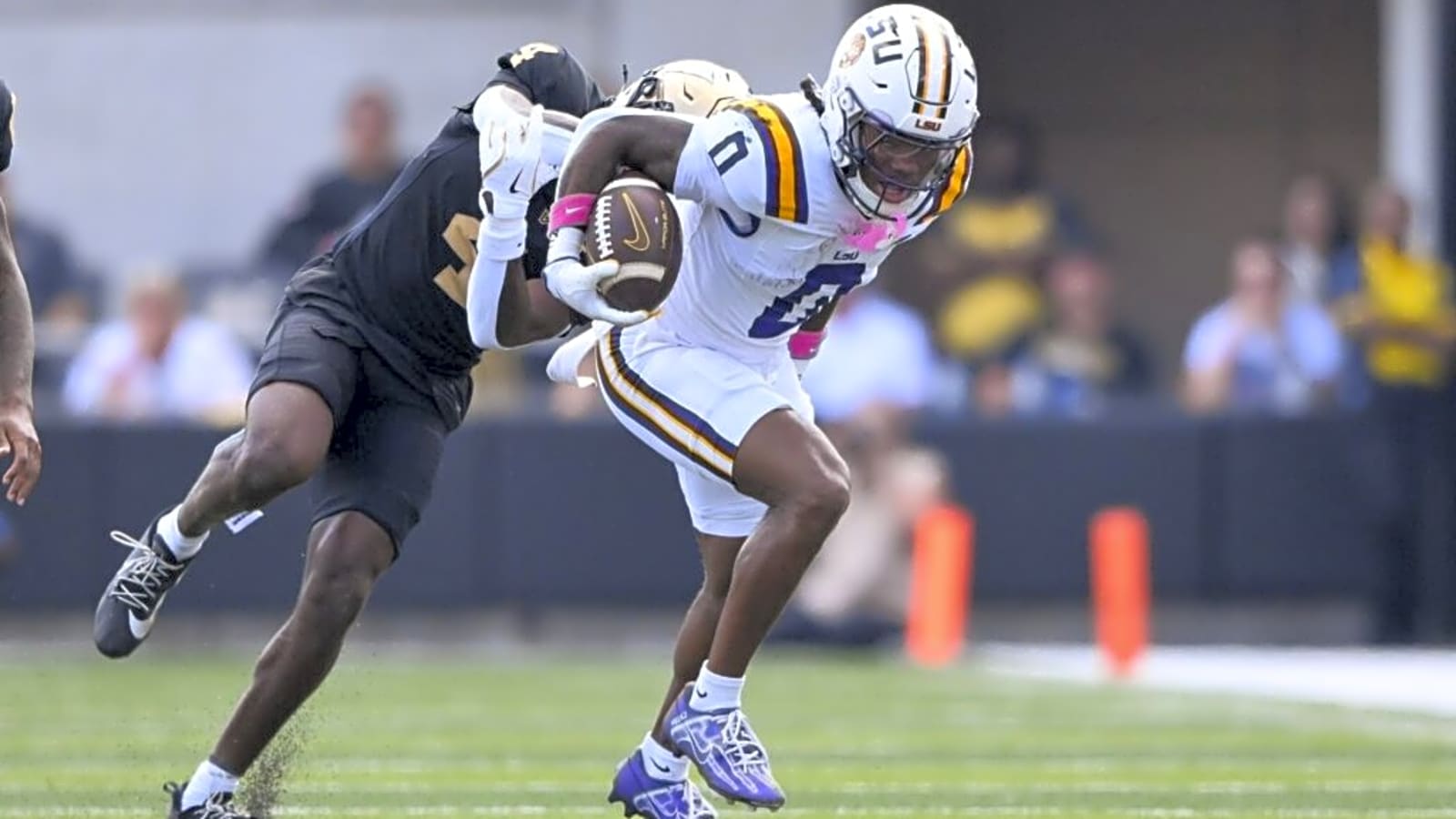
The days of name-brand programs casually chalking up wins to traditionally lesser programs are gone. LSU’s 31-24 loss to Vanderbilt put the college football world on notice that this Vanderbilt team is legitimately good. Beyond the surface, the results reflect a shift in the sport that has influenced how successful programs are built.
The transfer portal and NIL have affected the philosophies of programs off the field. On the field, the evolution of the game has changed the way most coaches approach developing schemes. It appears that LSU has caught up with the upper echelon programs in terms of talent acquisition, though the talent isn’t being maximized. The program obviously must make up ground on the field. We took a deep dive into the program to locate the disconnect that’s preventing the desired results in Baton Rouge.
Realizations from LSU’s Loss at Vanderbilt
Talent Doesn’t Win; Teams Do
LSU supplemented its 2025 top 10 recruiting class with the best transfer portal class in the country. Vanderbilt finished with the 247Sports Composite’s 51st-ranked class overall, which combines portal players with high school recruits. In fact, the Commodores haven’t had a class ranked higher than 42nd in the past three years. Considering the talent disparity, it’s hard to imagine Vanderbilt controlling the game from start to finish, right? Wrong. Vandy doesn’t have elite talent, but they have an identity.
The Vanderbilt roster follows the lead of its confident quarterback, Diego Pavia. Physical domination is an expectation, not a hope, for the Commodores. We witnessed offensive linemen in black and gold blocking LSU defenders 10 yards down the field with no regard for feelings or whistles. The Vanderbilt defenders boasted of a potential shutout leading up to Saturday’s contest. This isn’t a case of mind games or delusion; it’s an effective mentality that Clark Lea has injected into his program.
We’re now four years into Brian Kelly’s tenure, and the Tigers haven’t formed an identity. The Jayden Daniels-led Tigers had a high-octane offense with no defense. Furthermore, LSU has not effectively run the ball since featuring the threat of a running quarterback. The Tiger defense has improved immensely this year, but continues to give up plays to mobile quarterbacks. To be fair, Blake Baker has at least established an expectation of fielding an attacking, disruptive defense. As a team, the Tigers talk about championship expectations and where they want to be. The problem is, we’re not so sure they know how they plan to get there.
Dual Threat Dominance
Fortunately, the LSU defense won’t see quarterbacks like Pavia every week. He has mastered his offense, consistently making the right read on zone reads and RPOs. Even when the defense makes the right defensive call, his athleticism and creativity allow him to make positive plays. Believe it or not, LSU isn’t the only team that has issues against athletic quarterbacks. An elusive quarterback is a headache for any defensive coordinator. But we have a suggestion for the offensive staff: if you can’t beat them, join them.
LSU is understandably sold on Garrett Nussmeier as the starting quarterback. He waited patiently for his opportunity, has a live arm, and has made plays in high-stakes situations. With this in mind, our idea is geared more towards the future. However, this staff might not have a future in Baton Rouge if enough games go the wrong way in 2025.
Vanderbilt, Ole Miss, and Texas A&M (who visits Baton Rouge in days) all have quarterbacks who can hurt defense on the ground and through the air. Mobile quarterbacks change the numbers in the run game and restrict coverage options in the passing game. Sure, there are some teams like Ohio State and Alabama with successful pocket passers. But those teams’ offensive lines are light-years ahead of the Tigers’ group. At the very least, a more dynamic athlete at quarterback would give LSU a better chance of avoiding negative plays.
Coaching is Paramount
Both offenses had success in Nashville on Saturday. But they looked different. Vanderbilt took a measured, methodical approach with read options and constant motion. The game quickly reached a point where we expected the Commodore offense to score touchdowns. There were answers for every defensive look. The LSU defense was outstanding against the Vandy running backs for the most part. But the dedication it took to stop the backs allowed favorable matchups for the Commodore tight ends, who feasted.
LSU’s offensive success appeared to be more of a chore than the smooth operation we saw on the other side. Run plays either gained 10 yards or 1 yard. Any pass that Nussmeier took longer than two seconds to release presented the opportunity for a holding call. Wide receiver screens were called but not blocked. As always, it was rare to see an established play that set up another play.
The Tiger offense does not have the margin for error that comes with aimless play calling. Calls and sequences must be well thought out to compensate for the lack of competent play up front. We understand that offensive line shortcomings limit the offensive play sheet, but the best minds construct game plans that play to the strength of the personnel. In other words, it’s up to the million-dollar coach to figure it out.
If LSU plans to be a national contender again, sufficient won’t cut it at any position on the staff. Outstanding coaching minds get the most out of the resources available. The Tigers now have losses to Ole Miss and Vandy, neither of which has the same level of talent on the field as LSU. The difference is on the sidelines.
More must-reads:
- Examining best landing spots for James Franklin following Penn State exit
- Vanderbilt reaches its highest AP poll ranking in 78 years
- The 'College basketball AP preseason No. 1 teams' quiz
Breaking News
Trending News
Customize Your Newsletter
 +
+
Get the latest news and rumors, customized to your favorite sports and teams. Emailed daily. Always free!








